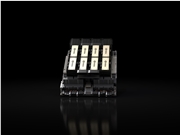The Southeast Asian AI chip industry has reached a historic moment! On Monday, Malaysian chip design company SkyeChip officially launched the country's first independently developed edge AI processor, MARS1000, during an industry event. This breakthrough marks a significant step for Malaysia in the global AI competition.
AIbase report According to Bloomberg, although the performance of edge processors cannot be compared to advanced chips from NVIDIA, the launch of the MARS1000 processor still holds milestone significance for Malaysia, which is seeking to play a larger role in the global AI competition. This is not only an important demonstration of Malaysia's local chip design capabilities, but also a key breakthrough for the country to achieve self-reliance in the upstream of the AI industrial chain.
Malaysia's AI Strategic Layout Is Becoming More Complete
In fact, Malaysia has already established a solid foundation in the chip manufacturing sector and has recently significantly increased its investment and layout in the AI field. At the end of 2024, the country announced the establishment of the Malaysia National AI Office, a specialized agency that will focus on seven core areas, including accelerating the adoption of AI technology, establishing a regulatory framework for AI applications, and key issues such as AI ethics.
These series of measures indicate that Malaysia is transitioning from a traditional role as a chip manufacturing contractor to higher-value AI technology innovation and application, striving to occupy a more important position in the global AI industrial chain.
Geopolitical Pressures Drive the Drive for Independent Innovation
Notably, the background of Malaysia's recent chip breakthrough is quite complex. In early July, there were rumors that the Trump administration was considering restricting the sale of American AI chips to Malaysia and Thailand, aiming to prevent these chips from flowing into the Chinese market through smuggling channels.
Although these rumors have not yet become reality, on July 14, the Ministry of Investment, Trade and Industry of Malaysia announced that it would implement trade license management for American AI chips. According to the new regulations, individuals and businesses planning to export or transfer American AI chips must notify the Malaysian government at least 30 days in advance.
This policy change undoubtedly provides stronger motivation for Malaysia to develop independent AI chip technology. Faced with potential supply chain uncertainties, Malaysia has chosen to reduce external dependence through technological innovation. The launch of the MARS1000 processor is a specific embodiment of this strategic thinking.
Edge AI Market Has Broad Prospects
Although edge AI processors may not match high-end chips at the data center level in terms of performance, they have unique advantages in many application scenarios such as the Internet of Things, smart manufacturing, and autonomous driving. Edge processors can perform AI computing directly on the device, without relying on cloud services, which not only significantly reduces latency but also provides better data privacy protection.
AIbase Analysis For emerging markets like Malaysia, focusing on the development of edge AI processors is indeed a wise strategic choice. On one hand, the edge AI market is in a period of rapid growth, providing ample market space for latecomers; on the other hand, the technical barriers for edge processors are relatively low, making it easier to achieve technological breakthroughs and industrial application.
As the global competition for AI technology becomes increasingly intense, more and more countries are beginning to realize the importance of mastering core chip technology. The launch of Malaysia's MARS1000 processor not only lays a technical foundation for the country's AI industry development, but also provides a useful reference for other countries seeking to break through in the AI chip field.
Looking ahead, Malaysia is expected to leverage its traditional advantages in manufacturing and combine its emerging AI chip design capabilities to find a unique position in the global AI industrial chain. The successful launch of the MARS1000 processor is likely just the beginning of Malaysia's rise in the AI chip industry.










